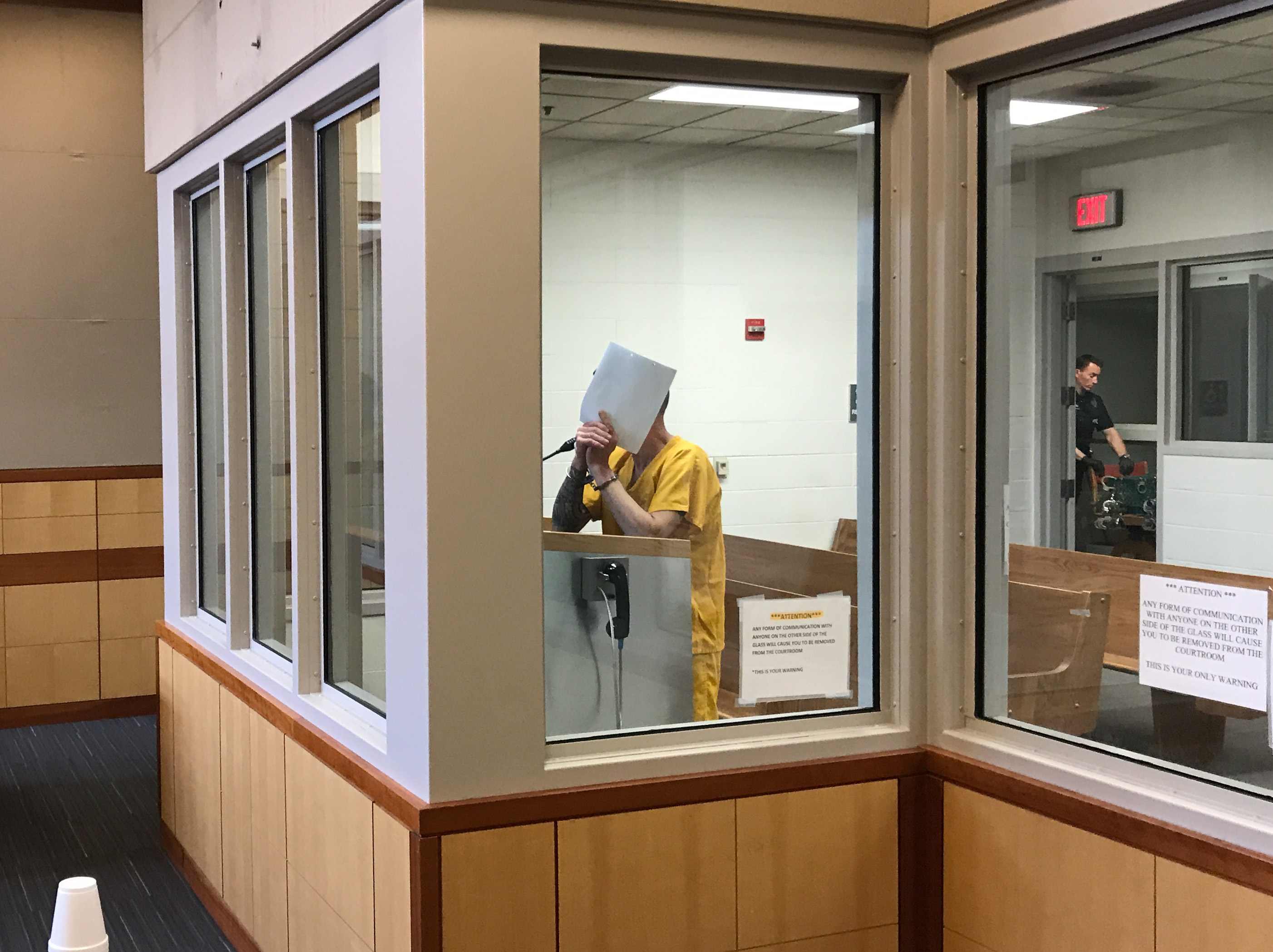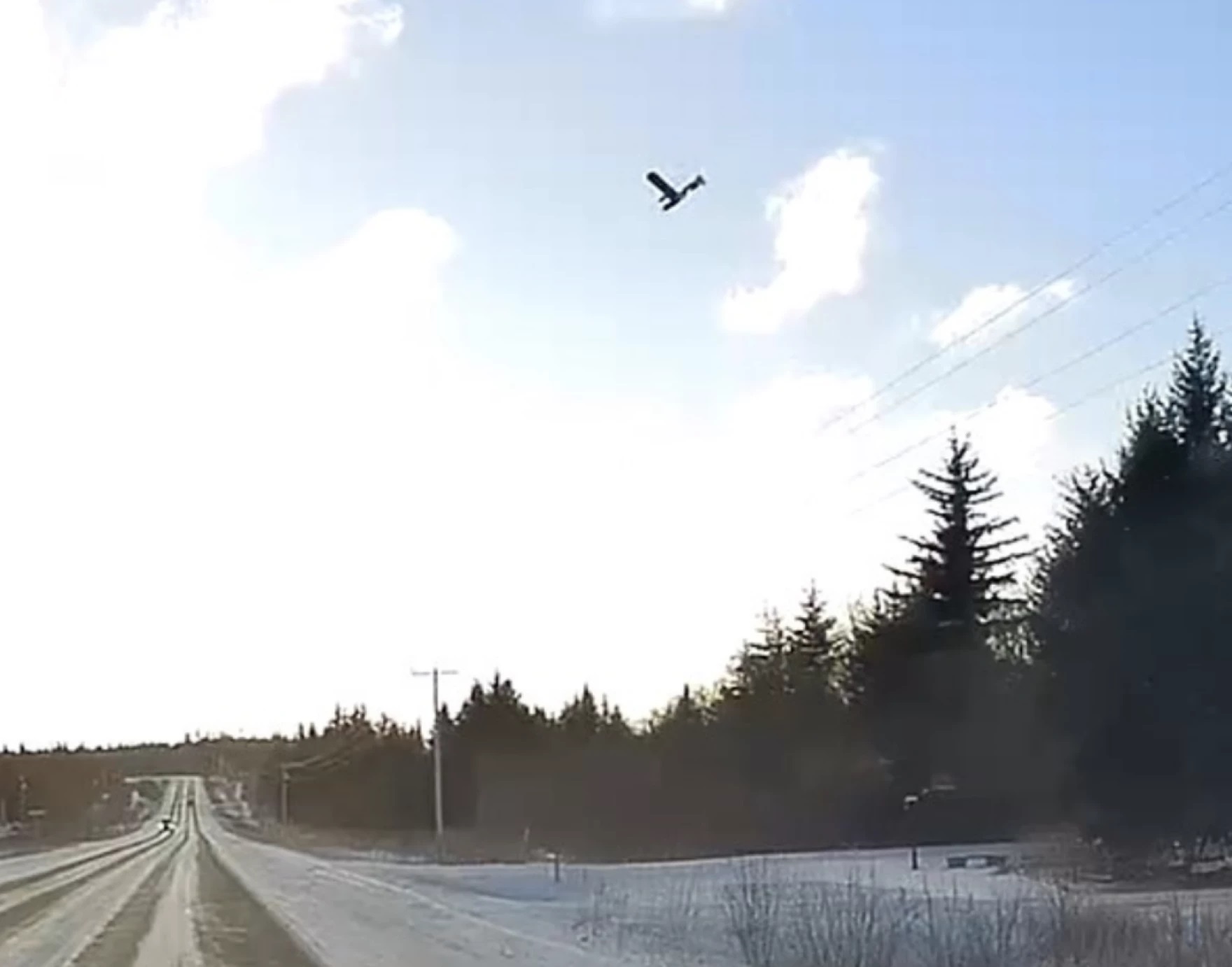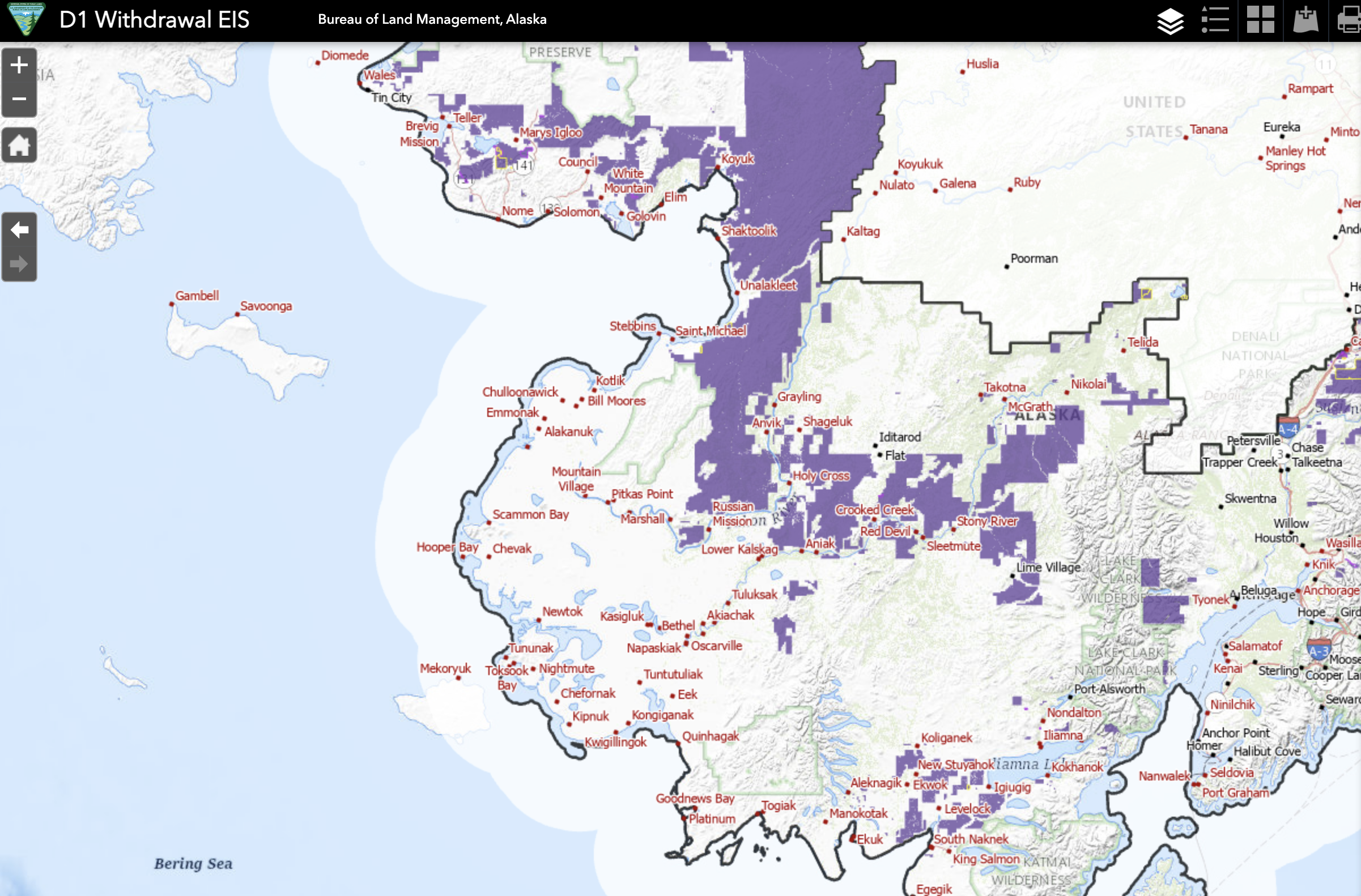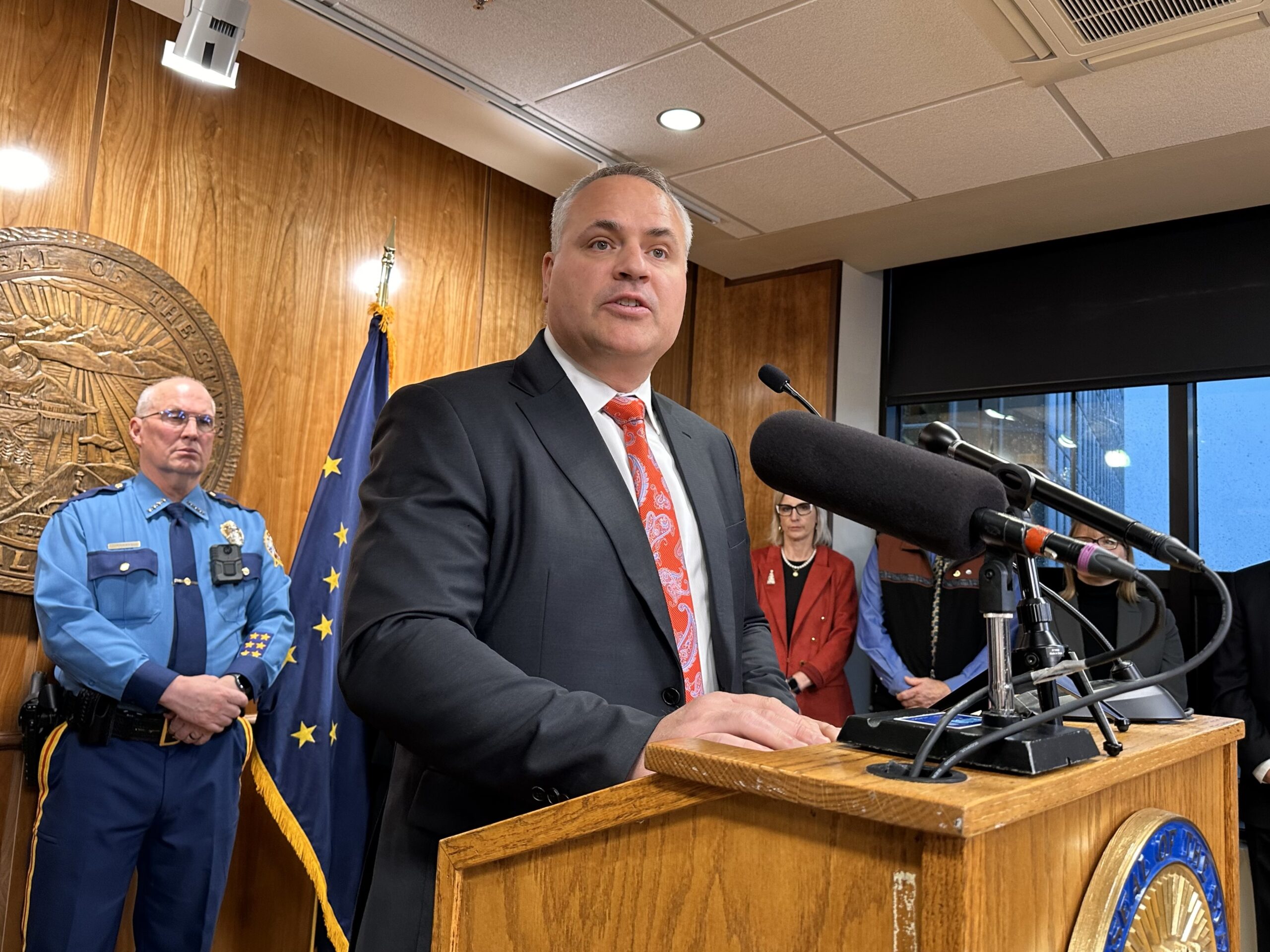Gregory Golodoff, the last surviving resident of Attu taken prisoner by the Japanese in 1942, had empathy for his captors before his death last month.
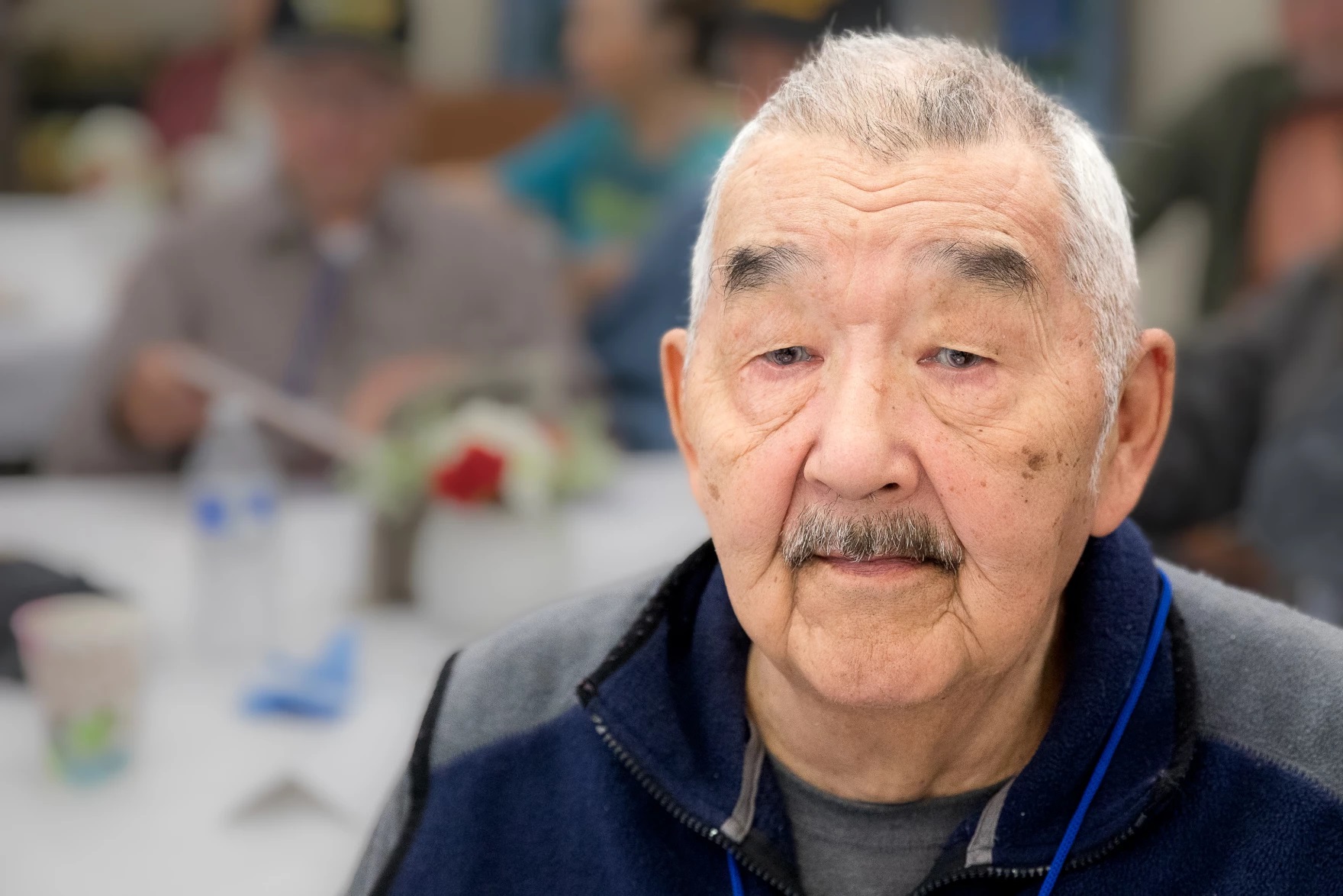 The last surviving person from Attu, Gregory Golodoff, passed away earlier this month at the age of 84. (Lisa Hupp/U.S. Fish And Wildlife Service)
The last surviving person from Attu, Gregory Golodoff, passed away earlier this month at the age of 84. (Lisa Hupp/U.S. Fish And Wildlife Service)
Gregory Golodoff was sitting in a sod house when the soldiers arrived.
“We had heard machine-gun fire from this side, this side, you know. I forgot who it was told us they’re coming from this side, they’re coming from that,” Golodoff said in a 2018 interview — 75 years after the Battle of Attu.
The Japanese Imperial Army invaded the Unangax? village in 1942, where the three-year-old Golodoff lived with his family.
Golodoff was the last surviving person who was born and lived in Attu, the last island in the Aleutian Chain before reaching Russia.
His death on Nov. 17 marks the end of an era when there were still people alive who had lived in the now-lost village.
The Japanese army occupied the island for three months before taking all 42 Attu residents to Japan as prisoners of war.
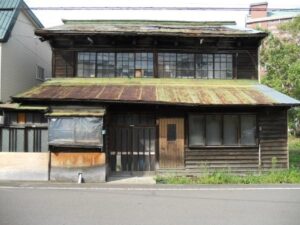 The building in Otaru, Japan, where Golodoff and his family were first taken upon arriving in Japan, seen in 2017. (Rachel Mason/National Park Service)
The building in Otaru, Japan, where Golodoff and his family were first taken upon arriving in Japan, seen in 2017. (Rachel Mason/National Park Service)Golodoff’s entire family was imprisoned in a dormitory in the port city of Otaru, about 500 miles north of Tokyo. The next three years were full of disease and malnourishment, straddling the brink of starvation.
“We would just get a bowl of rice a day or sometimes a salted herring,” Golodoff said.
He remembered the cooks taking pity on him and treating him like “a pet.”
 The Oct. 3, 1945 issue of the Daily Alaska Empire newspaper reports that the surviving Attuan POWs have been released. (The Daily Alaska Empire)
The Oct. 3, 1945 issue of the Daily Alaska Empire newspaper reports that the surviving Attuan POWs have been released. (The Daily Alaska Empire)“I was a cute little guy, I guess, because a Japanese cook scraped burned rice from the pot and would bring it to me,” he recalled.
People who knew Golodoff throughout his life have remarked at how little resentment he felt toward his captors. That empathy shows even in those early memories.
“Well, gosh, we were hungry, but so were the Japanese,” he said. “The Japanese were starving, too.”
Trying to forget
Only half of the Attuan POWs survived the experience. Golodoff lived through it, as did his mother, older brother, Nick, and his sister, Elizabeth. But many of their family members didn’t make it, including Golodoff’s father, who died of disease in Japan.
“We cremated all of them,” Golodoff said. “All the people that died in Japan.”
Those who did survive were released when the war ended, but couldn’t return home. Many homes had been destroyed, and the United States government judged it too difficult to relocate the freed POWs back to Attu.
Instead, the village was abandoned and the survivors moved to other communities. Golodoff and his family settled in Atka, an Unangax? village about 500 miles east of Attu.
Those who died in Japan were also brought to Atka to be laid to rest.
“They brought ‘em all back in three coffins,” Golodoff said. “All the ashes in three coffins and buried by the church in Atka.”
Golodoff spent most of his life in Atka. He practiced subsistence, hunted, fished and said he stayed too busy to think much about the war.
“I didn’t have time to wonder about anything, because most of the time we had to hunt for food, you know, go out and fish and stuff like that,” he said.
He joined the Army, was stationed in Germany, and then moved back to Atka. He ran the village store, and became the tribal president in the 1980s when Atka saw significant growth, including the construction of a new school and a subdivision about a mile from the old village.
In all those years after the war, Golodoff said the survivors didn’t want to talk about what happened. He didn’t even speak about it with his mother.
“She never told me anything. They don’t want to talk about anything like that. They’d rather forget it,” he said.
But a new generation of Attuan descendants are talking about it. Crystal Dushkin grew up in Atka, but her great-grandmother was from Attu.
“A lot of people refer to the Aleutian Campaign as the ‘Forgotten War,’” Dushkin said in a 2017 interview with KUCB. “But our people have never forgotten it. It’s never lapsed from our memory.”
Dushkin is one of the many people who work tirelessly to preserve Unangax? culture and the memory of Attu.
“That’s what I wish for the younger generation, as well,” she said. “To always hold on to what our ancestors taught us. To always remember them, and to make sure that they teach it to their children and grandchildren so that it’s never forgotten.”
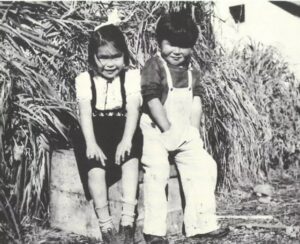 Gregory Golodoff and his sister, Elizabeth Golodoff Kudrin, on Atka Island, sometime between 1946-1947. (Courtesy National Park Service, University Of Washington Press and Ethel Ross Oliver)
Gregory Golodoff and his sister, Elizabeth Golodoff Kudrin, on Atka Island, sometime between 1946-1947. (Courtesy National Park Service, University Of Washington Press and Ethel Ross Oliver)Then and now
People often compare the Aleutian Campaign to the attack on Pearl Harbor, but Pearl Harbor was an attack from the sky. The Battle of Attu, and a similar one on the Aleutian Island of Kiska, mark the only times the Japanese actually invaded the United States. The Aleutian Campaign was the first time foreign forces occupied American soil since the War of 1812.
In 2012, the National Parks Service held a meeting for all the Attuan descendants and survivors. Golodoff wanted to meet other descendants, but he also wanted to connect with other surviving POWs.
“I was going to see my peers,” he said. “Then I went there, I was disappointed. Nobody survived except us.”
There were only three survivors left. Greg, his brother Nick, and his sister Elizabeth Kudrin.
“I guess we just lived the longest. That’s all,” he said.
Nick Golodoff passed away two years after the reunion, leaving just Gregory and Elizabeth.
And then, in February of this year, Elizabeth passed away.
Lost but not forgotten
Gregory Golodoff passed away in Anchorage on Nov. 17 at the age of 84.
Ten days later, dozens of people came to St. Innocent Cathedral in Anchorage to pay their respects.
Moses Dirks is an Unangax? scholar and a friend of Golodoff from Atka. He said as a child, he looked up to Golodoff, who was a good role model in the community.
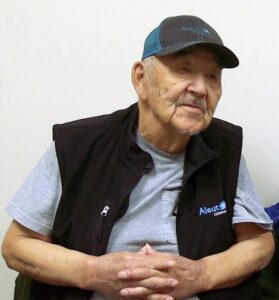 Golodoff was the very last person on Earth who was born and lived in Attu, a village lost to war — the last American citizen whose home was occupied by a foreign force. (Chrissy Roes/Aleutian Pribilof Islands Association, Inc.)
Golodoff was the very last person on Earth who was born and lived in Attu, a village lost to war — the last American citizen whose home was occupied by a foreign force. (Chrissy Roes/Aleutian Pribilof Islands Association, Inc.)“He was always helpful, and he was always willing to help the people there in Atka for many years,” Dirks said.
Golodoff’s niece, Joanna Thompson, said she admired how her uncle would never show anger or resentment for what happened to him.
“Uncle Greg just turned it into something else,” she said. “He could have been one of the other children that passed. So he was lucky to be alive, and he just found joy in every day.”
Dimitri Philemonof, the CEO of the Aleutian Pribilof Islands Association, described Golodoff as a quiet and humble man.
“Throughout his life, he has been a great leader,” he said. “I never saw him hate or anything of that sort. I think that says a lot for the Aleut people.”
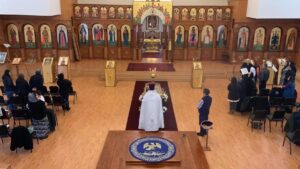 Gregory Golodoff passed away in Anchorage on Nov. 17 at the age of 84. Ten days later, dozens of people came to St. Innocent Cathedral in Anchorage to pay their respects. (Courtesy Isabella Iparraguirre)
Gregory Golodoff passed away in Anchorage on Nov. 17 at the age of 84. Ten days later, dozens of people came to St. Innocent Cathedral in Anchorage to pay their respects. (Courtesy Isabella Iparraguirre)Golodoff was the very last person on Earth who was born and lived in Attu, a village lost to war — the last American citizen whose home was occupied by a foreign force. But to Golodoff, those were just the facts of his life.
“It’s just something that happened. Things will happen. We’re all going to experience something,” he said. “We’re not really here. From dust we came, to the dust our bodies will return. So we don’t die, as far as I’m concerned. We don’t die. We might depart from our bodies, but that’s about it.”
Golodoff was buried at Anchorage Memorial Park Cemetery on Nov. 27.



